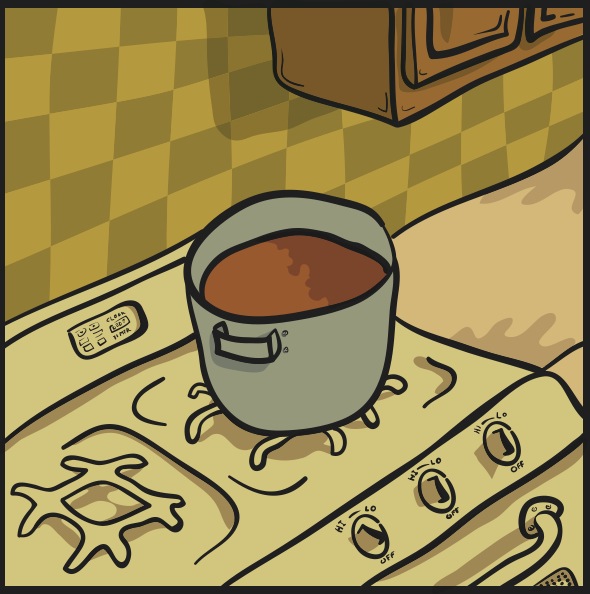
pot, l
(article, Carrie Floyd)
[%pageBreakSettings nobreak=true] Once a week, on a day I’m working at home or over the weekend, I try to make a big pot of something — beans, soup, sauce — that becomes the starter for future meals. This pot usually gets divvied into at least one dinner, a couple of lunches, and a quart for the freezer. It’s that container in the freezer I’ve come to relish, my money in the bank. When there are four or five of those tubs tucked away, I feel rich in a way that currency can’t provide. On nights when I'm pressed for time or am not up to the task of a full meal cooked from scratch, and realize it would be embarrassing to show up at the Thai restaurant again, I open the freezer and take out a brick of gold. If it’s soup, I’ll make grilled cheese sandwiches or a salad to go along with it. If it’s sauce, dinner can be as easy as setting a pot to boil for pasta. Tomato sauce begs for sausages and polenta. A pot of beans that several weeks ago provided meals of rice and beans also yielded several containers for the freezer. Now thawed, those seasoned beans become a pot of vegetarian chili with the addition of sautéed onions, peppers and celery, and a can of tomatoes. And since that didn’t take much time, I’ll throw a pan of cornbread in the oven. [%image "pot" float=left width=350 showCredit=true caption="A pot of sauce is like money in the bank."] There’s something about having one thing already done that makes cooking dinner less daunting. If I don’t get home until after six and I’m looking at a two- or three-hour window to make and eat dinner, plus oversee homework and music practice, baths and bedtime, starting at square one in the kitchen feels overwhelming. Ordering pizza or takeout seems like the only logical option (and sometimes it is). But having an ace-in-the-hole — soup in the freezer, leftover roasted chicken, cooked beans in the fridge — makes it feel like dinner has been started. I also find that with a head start I’m more likely to cook a balanced meal. Because I’m using pesto from the freezer for pasta, making a salad is no big deal, especially when there's plenty of vinaigrette or blue-cheese dressing from the last time I made salad. When I thaw a stew for dinner, it’s a cinch to make mashed potatoes and sauté green beans to go along with it. That said, if I was making stew on a weeknight, by the time I got it to the table, I’d probably call it dinner, sans sides. Making a main course takes enough time, I tell myself — I’m not spinning salad greens, too. When I was a kid, my mom was a pro at getting dinner on the table every night, after work, in half an hour. Once I asked her why she cooked the same foods every week, a repertoire that revolved around hamburger: spaghetti, meatloaf, tacos. She replied that it was a diet based on economy of both money and time. And, too, it was food we all liked. As a parent, I’ve come to appreciate the shrewdness of a repertoire, not to mention the simplicity of the “meat and three” combo. On nights when I put potatoes in the oven to bake, steam broccoli, and pan-fry chops, I feel like I pulled a fast one — it’s so easy! And there’s still time left to put on a fresh housedress and whip up a couple of martinis before Mr. Cleaver gets home! That said, because we don’t eat meat more than a couple times a week, and I have a yen for variety, the “meat and two” is more like a special guest than a standby in our house. Choosing to eat a diet that includes a lot of fresh food inherently involves more KP. Part of the reason my mom was able to turn out a meal quickly is that she relied on the conveniences of garlic salt, dehydrated onions, canned vegetables, and Campbell's soup. Thirty years later, now the cook of my own kitchen, I want the taste and added nutritive value of fresh produce. But there’s a cost to that, in money and time; fresh food takes more time to prepare. Sure, I can open a can of spinach, and that’s a lot quicker than washing a few bunches, but who wants to eat canned spinach? Not me, thanks. [[block(sidebar). h1.Featured recipes]] What it all comes down to is this: It makes sense to get in the habit of cooking large quantities and banking your efforts. Think like a farm wife. One friend of mine turns the surplus of her summer CSA box into vegetable soup, which gets stashed in the freezer for winter. Another friend always bakes two pizzas, one for today and the other for tomorrow. The same friend also doubles the amount of burritos she makes, and freezes half for another day. Other friends, when grilling, throw on an extra chicken for future meals. Someone else I know makes a point of washing and drying enough salad greens on Sunday for the upcoming week; since she started doing this, she eats a lot more salad because she doesn’t have that daily resistance to washing greens. For my own part, I know my limitations. Most of the above practices I’ve adopted. Casseroles and entire cakes, I’ll probably never put away in my freezer — that's more ambitious than I am. But those kinds of foods that require little time to double or prepare in larger quantities — soup, sauce, pizza dough, cookies — I don’t think twice about now. It's a gift I give myself. p(bio). Carrie Floyd is the Culinate food editor.

pot, l

reference-image, l